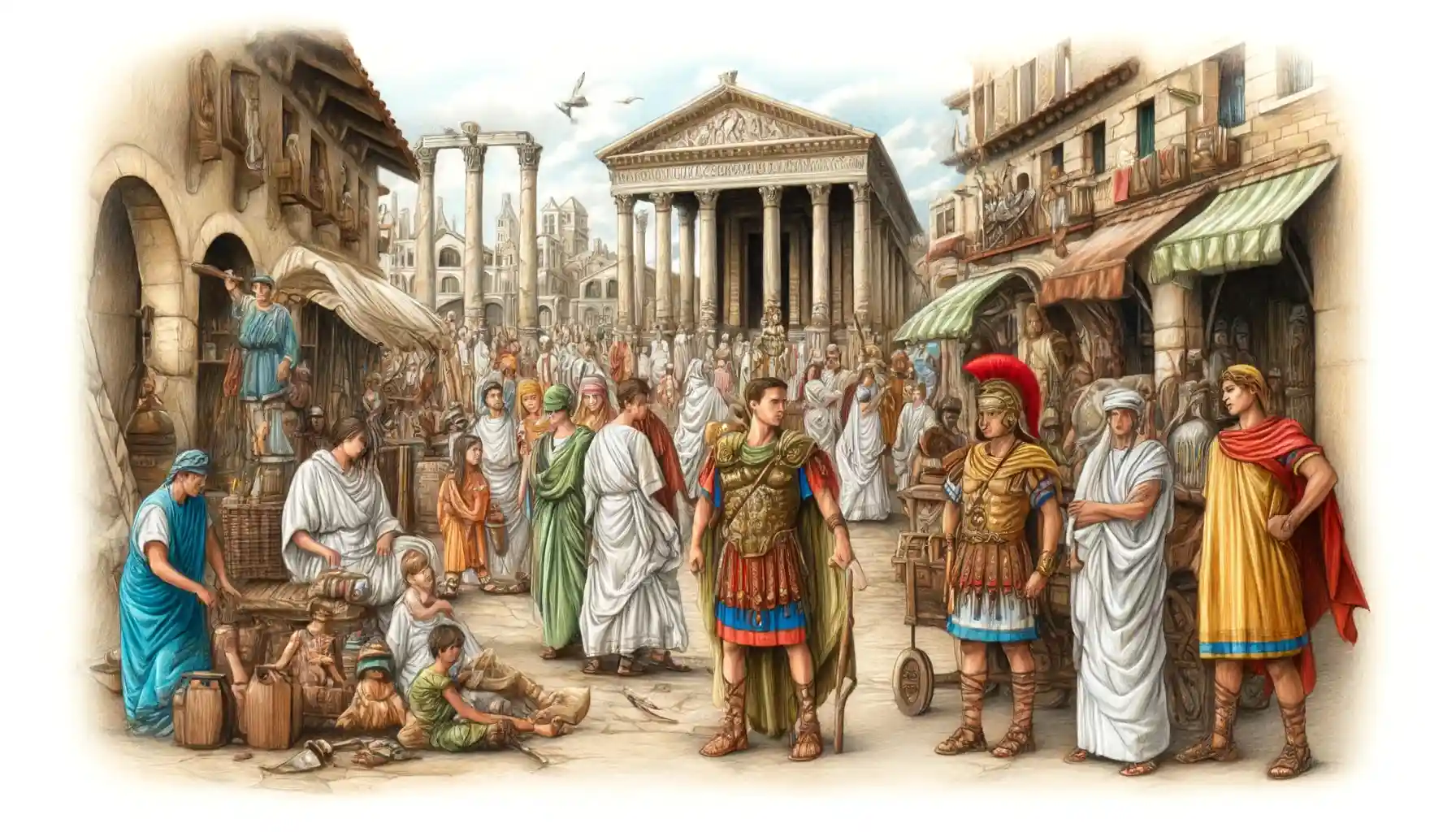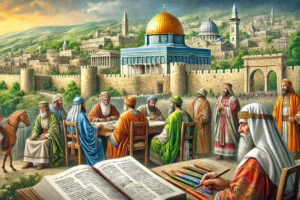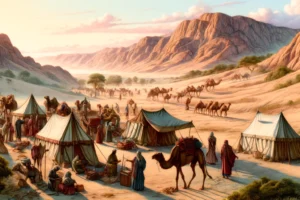
Romans: Influence on Early Christianity
The Romans played a significant role in the New Testament, influencing early Christianity through their governance, culture, and interactions with key figures. Here are some quick facts about the Romans in the Bible:
- Dominant Power: The Roman Empire ruled the Mediterranean during the New Testament period, including Judea.
- Governance: Roman officials like Pontius Pilate, who authorized Jesus’ crucifixion, played crucial roles (Matthew 27:24-26).
- Citizenship: Roman citizenship, held by Apostle Paul, provided legal protections and rights (Acts 22:25-29).
- Persecution: Christians faced persecution, especially under emperors like Nero, who blamed them for the Great Fire of Rome in AD 64.
- Roman Roads: Facilitated the spread of Christianity, allowing apostles to travel and establish churches.
- Centurions: Often depicted positively; for example, the centurion at Jesus’ crucifixion acknowledged Him as the Son of God (Mark 15:39).
- Military Presence: Ensured Roman authority, involved in events like Jesus’ arrest and guarding His tomb (Matthew 27:27-66).
- Census and Taxation: Roman practices led to events like Jesus’ birth in Bethlehem (Luke 2:1-7).
- Symbolic Representation: In Revelation, Rome is symbolically referred to as “Babylon,” a powerful entity opposed to God (Revelation 17-18).
- Paul’s Mission: Paul desired to preach in Rome, eventually arriving as a prisoner and continuing his ministry (Acts 28:16-31).
Introduction
The Romans, as a people and an empire, are deeply intertwined with the narrative of the New Testament. Their political dominance, sophisticated infrastructure, and interactions with early Christians significantly shaped the context and spread of Christianity. Here is a detailed biblical analysis of the Romans and their influence.
Dominant Power
The Roman Empire, under emperors like Augustus and Tiberius, was the preeminent political and military power during the New Testament period. Rome’s extensive control over the Mediterranean basin, including the region of Judea, created a backdrop against which the events of the New Testament unfolded. This period saw the implementation of Pax Romana, a time of relative peace and stability which facilitated the spread of ideas and cultures, including Christianity.
Governance
Roman governance had a direct impact on key biblical events. Pontius Pilate, the Roman governor of Judea, played a pivotal role in the trial and crucifixion of Jesus Christ. His interaction with Jesus and the Jewish leaders is detailed in all four Gospels (Matthew 27:24-26; Mark 15:1-15; Luke 23:1-25; John 18:28-19:16). Pilate’s decision to crucify Jesus, despite his apparent reluctance, was influenced by political pressures and the threat of unrest.
Citizenship
Roman citizenship was a prized status that conferred numerous privileges and legal protections. The Apostle Paul, a Roman citizen by birth, utilized his citizenship to navigate various legal challenges and to further his missionary work. In Acts 22:25-29, Paul invokes his citizenship to avoid scourging, and in Acts 25:10-12, he appeals to Caesar for a trial in Rome, highlighting the legal advantages and mobility that citizenship provided.
Persecution of Christians
Initially, the Roman authorities viewed Christianity as a sect of Judaism, but as it grew distinct and rapidly expanded, it faced significant persecution. The Great Fire of Rome in AD 64, for which Emperor Nero blamed the Christians, marked the beginning of intense and brutal persecution. This included public executions, imprisonment, and martyrdom, vividly described by Roman historians like Tacitus. This persecution is also referenced in the Book of Revelation (Revelation 2:10).
Roman Roads
The sophisticated network of Roman roads was crucial for the dissemination of Christianity. These roads, which connected distant parts of the empire, enabled missionaries like Paul to travel extensively. Paul’s missionary journeys, as detailed in the Acts of the Apostles, were facilitated by this infrastructure, allowing him to visit and establish churches in key cities such as Ephesus, Corinth, and ultimately Rome itself (Acts 28:14-16).
Centurions
Roman centurions are often portrayed positively in the New Testament, reflecting their roles as disciplined and honorable soldiers. The centurion at the crucifixion of Jesus recognized His divine nature, saying, “Truly this man was the Son of God” (Mark 15:39). Cornelius, a centurion mentioned in Acts 10, is described as a devout and God-fearing man who received a vision from God, leading to his conversion and the spread of the Gospel to Gentiles.
Military Presence
The Roman military presence in Judea was a constant reminder of Roman authority. Roman soldiers were involved in significant events, such as the arrest of Jesus in Gethsemane (John 18:12), the mockery and scourging of Jesus before His crucifixion (Matthew 27:27-31), and the guarding of His tomb to prevent His disciples from claiming He had risen (Matthew 27:62-66). The military’s role underscored the political tension and control exercised by Rome over Judea.
Census and Taxation
Roman administrative practices, such as censuses and taxation, had direct implications for biblical events. The decree from Caesar Augustus that “all the world should be registered” led Joseph and Mary to travel to Bethlehem, where Jesus was born (Luke 2:1-7). This fulfillment of the prophecy concerning the Messiah’s birthplace (Micah 5:2) illustrates the interplay between Roman governance and biblical prophecy.
Symbolic Representation
In the Book of Revelation, Rome is symbolically referred to as “Babylon,” representing a powerful, corrupt, and idolatrous empire opposed to God (Revelation 17-18). This symbolic portrayal emphasizes Rome’s role as an antagonist in the apocalyptic vision, reflecting the early Christian community’s view of the empire’s moral and spiritual corruption.
Paul’s Mission to Rome
The Apostle Paul had a strong desire to visit Rome to preach the Gospel, viewing it as a strategic center for spreading Christianity throughout the empire. His Epistle to the Romans, written before his arrival, is a profound theological work addressing key doctrines such as justification by faith, the universality of sin, and salvation through Jesus Christ. Paul’s eventual journey to Rome as a prisoner, detailed in Acts 27-28, highlights his unwavering commitment to his mission despite numerous hardships. In Rome, Paul continued to preach and teach for two years while under house arrest (Acts 28:30-31).
Conclusion
The Romans’ impact on the New Testament narrative is profound, shaping the historical, cultural, and political context in which early Christianity developed. From governance and citizenship to persecution and infrastructure, the influence of Rome is evident in the spread of the Gospel and the growth of the early church. Understanding the role of the Romans enriches the comprehension of the New Testament and the emergence of Christianity in a complex and multifaceted empire.



